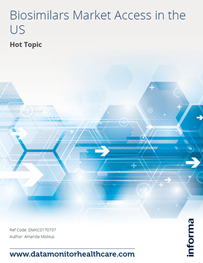Report Library
All Reports
Datamonitor Biosimilars Market Access in the US (2017)
March 13, 2017
This updated report was published by our sister product, Datamonitor Healthcare, and is available for purchase here. Subscribers of
Datamonitor Healthcare can download this report for free by logging into the Datamonitor Healthcare website.
The route to a formal US regulatory pathway for biosimilar approval was established with the creation of the Biologics Price Competition and Innovation Act of 2010. However, it took five more years for the first biosimilar to be launched in the US through this pathway, namely Zarxio. The US Food and Drug Administration (FDA) has since approved three additional biosimilars – Inflectra, Erelzi, and Amjevita – but of these three, only Inflectra has been launched to date. Despite the presence of this regulatory pathway and accompanying FDA guidance documents for the pharmaceutical industry to ensure consistent approaches to clinical trials, similarity, and interchangeability, there are still many unanswered questions which are likely to have an impact on the launch and uptake of biosimilars over the next few years.
A number of regulatory uncertainties exist that require clarification in order for the US biosimilars market to be fully realized. These uncertainties include questions on labeling, substitution, and interchangeability. In addition to the regulatory questions, there are also a number of legal issues that are yet to be resolved and which may have a significant impact on the future approval and launch of biosimilars in the US. The most important of these involve the 180-day launch notification period and the patent dance provisions, both of which will be argued in front of the US Supreme Court during 2017.
Once these regulatory and legal hurdles are overcome, it is anticipated that there will be few, if any, major obstacles to market access, with access expected to be relatively straightforward due to the cost benefits that biosimilars offer. Physician reluctance to use biosimilars interchangeably with the original product may prove to be an issue, albeit one that can be overcome with education efforts.
The route to a formal US regulatory pathway for biosimilar approval was established with the creation of the Biologics Price Competition and Innovation Act of 2010. However, it took five more years for the first biosimilar to be launched in the US through this pathway, namely Zarxio. The US Food and Drug Administration (FDA) has since approved three additional biosimilars – Inflectra, Erelzi, and Amjevita – but of these three, only Inflectra has been launched to date. Despite the presence of this regulatory pathway and accompanying FDA guidance documents for the pharmaceutical industry to ensure consistent approaches to clinical trials, similarity, and interchangeability, there are still many unanswered questions which are likely to have an impact on the launch and uptake of biosimilars over the next few years.
A number of regulatory uncertainties exist that require clarification in order for the US biosimilars market to be fully realized. These uncertainties include questions on labeling, substitution, and interchangeability. In addition to the regulatory questions, there are also a number of legal issues that are yet to be resolved and which may have a significant impact on the future approval and launch of biosimilars in the US. The most important of these involve the 180-day launch notification period and the patent dance provisions, both of which will be argued in front of the US Supreme Court during 2017.
Once these regulatory and legal hurdles are overcome, it is anticipated that there will be few, if any, major obstacles to market access, with access expected to be relatively straightforward due to the cost benefits that biosimilars offer. Physician reluctance to use biosimilars interchangeably with the original product may prove to be an issue, albeit one that can be overcome with education efforts.
| Disease Group Covered: |
Allergy
Autoimmune/immunology Cardiovascular Dermatology Endocrine ENT/Dental Gastroenterology (Non Inflammatory Bowel Disease) Hematology Infectious Disease Metabolic Neurology Not Specified Obstetrics/Gynecology Oncology Ophthalmology Orthopedics Psychiatry Renal Respiratory Rheumatology (Non Autoimmune) Urology |
Additional Resources:
